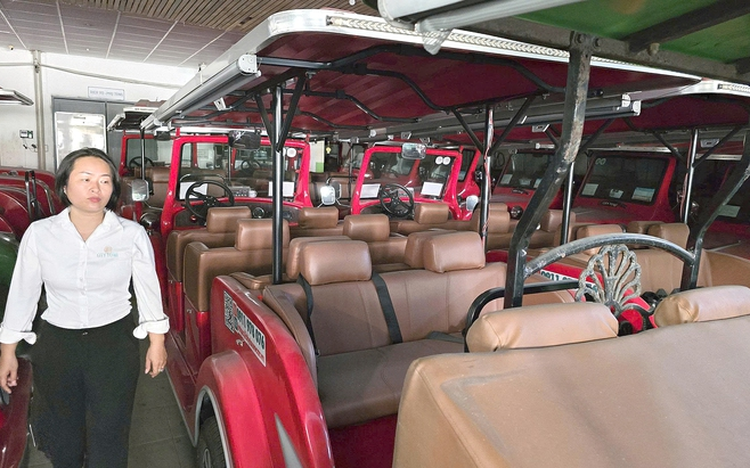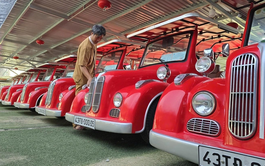
Many tourist electric car companies in Da Nang City, central Vietnam are struggling as vehicles are left idle. Photo: Hien Le / Tuoi Tre
A representative of an electric vehicle company in Da Nang said they had invested in electric vehicles for tourist transport, but since mid-February, the entire fleet has had to halt operations due to a regulation that allows four-wheeled electric vehicles used to transport tourists to operate only on roads with a maximum speed limit of 30 km/h.
Since the restriction came into effect, drivers and staff have received little to zero salary.
The company has tried to keep employees motivated in hopes that the regulation would be lifted, but so far, there has been no solution.
According to tourist electric vehicle businesses, Da Nang has very few roads marked with a 30 km/h speed limit.
The new rule has significantly limited operational areas, leaving hundreds of vehicles idle and resulting in major losses for companies.
In 2016, the government permitted Da Nang to pilot the use of four-wheeled electric vehicles for tourist transport within a limited area.
Four companies put 85 vehicles into operation before 2017, while two of these companies added 15 vehicles in December 2024.
Meanwhile, in Khanh Hoa Province, south-central Vietnam, the deputy general director of one company reported that they currently operate 20 tourist electric vehicles in Nha Trang.
The new regulation has severely impacted the city’s tourism sector, as these electric vehicles are popular with both domestic and international tourists, especially for coastal sightseeing.
Operational challenges for electric vehicles
According to the Da Nang Department of Construction, during the pilot period, the local government and relevant agencies always supported businesses.
However, as this was a pilot project with a limited operational scope, the city’s leadership did not direct or encourage businesses to invest in additional vehicles.
Recently, based on a review of the pilot program by the Ministry of Transport (now the Ministry of Construction) and opinions from other ministries and agencies, the government instructed provincial-level authorities to end the pilot by December 31, 2024.
The Traffic Police Department under the Ministry of Public Security also pointed out several limitations and issues with the current operation of those four-wheeled electric vehicles that may impact public order and traffic safety.
The Department of Construction stated that it and local state management agencies understand the challenges facing businesses when being required to adjust the operational scope of these vehicles.
Chu Van An, deputy director of the Khanh Hoa Department of Construction, said that electric vehicle services for tourists in Nha Trang are at risk of being shut down due to the new regulation.
Currently, there are no roads in Nha Trang with a 30 km/h speed limit sign, except for a few construction zones.
An acknowledged the challenges businesses face but emphasized that they must comply with the regulation or face penalties from authorities.
In Phu Quoc City off Kien Giang Province, southern Vietnam, electric vehicles with passenger cabins are still operating normally.
However, they are limited to inner-city roads with speed limits around 30 km/h.
Phu Quoc chairman Tran Minh Khoa said the city has instructed relevant agencies to assess the safety of these vehicles to ensure they are suitable for passenger transport.
For now, the city encourages businesses operating these vehicles to review their operations, register, undergo safety inspections, and comply with regulations.
On Monday afternoon, authorities in Hoi An City, along with the Quang Nam Province Department of Construction, surveyed roads to consider installing 30 km/h speed limit signs, aiming to enable tourist electric vehicles to legally operate.
According to a representative of an electric vehicle company in Hoi An, operations are allowed until the end of June.
For several months, businesses have been anxious about the regulatory restrictions, as electric vehicles are widely used and favored by tourists in Hoi An. They also align with the trend of green tourism.
"We sincerely hope authorities will ease restrictions and find flexible solutions to leverage the advantages of electric vehicles in tourism," the representative said.
"These vehicles are not just for transport — they are also used in tour packages that tourists greatly enjoy."



Max: 1500 characters
There are no comments yet. Be the first to comment.